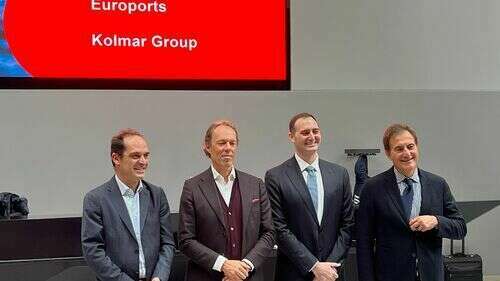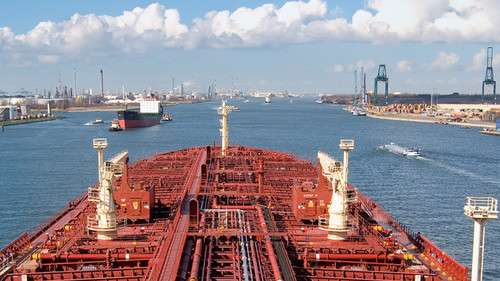SynPet Technologies to bring emerging technology in plastics recycling to the Port of Antwerp-Bruges
SynPet Technologies, the Belgium-based chemical recycling company offering a unique solution for plastic waste, is investing €300 million in an innovative facility that converts all types of plastics into a circular naphtha substitute without pre-treatment and with efficient conversion rates.
Port of Antwerp-Bruges Becomes Global Centre for Circular Plastic Recycling
Belgium-based Turkish technology company SynPet Technologies today announced the construction of its first commercial recycling plant in the Port of Antwerp-Bruges. The €300 million investment follows thirteen years of research and development into a greener and more cost-efficient form of plastic recycling, capable of processing waste that cannot be recycled with current methods such as pyrolysis and gasification. The new facility will transform 250,000 tonnes of untreated mixed plastic waste each year into circular products such as circular naphtha substitute and renewable natural gas, marking a brand new approach to chemical recycling.
Unique technology: all types of plastics, less energy
SynPet’s patented Thermal Conversion Process (TCP®) recycles all carbon-containing waste, including plastics that cannot be processed by existing mechanical or chemical methods. The process uses water under elevated pressure and temperature in combination with thermal cracking in a multi-stage process — making it more energy-efficient and economically viable on an industrial scale. The TCP® process enters full commercial deployment, following SynPet’s consistent running of its existing Demonstration Plant, achieving necessary performance targets; and is now assessed as being ready for large-scale adoption.
The main product of the TCP® process is a high-quality circular naphtha substitute that can be directly blended by petrochemical companies into their existing naphtha feedstock for new plastics manufacturing — without the need for any further purification or upgrading.
What is circular naphtha substitute (CNS®)?
CNS® is a premium-grade product compared to standard pyrolysis oil, offering a significantly higher value in use. It has a final boiling point (FBP) of 360 °C, aligning with the maximum acceptable boiling point for European steam crackers, and similar handling characteristics as the conventional feedstocks.
Unlike standard pyrolysis oil, CNS® requires no additional refinery upgrading or hydro processing, making it suitable for direct blending into cracker feedstock. Defined by a unique quality specification, CNS® ensures consistent performance as a direct-blend feedstock — a truly revolutionary technology introduced by SynPet.
Strategic anchor in the Port of Antwerp-Bruges
The plant will be built on a site with direct water and land access, in collaboration with Euroports and the Port of Antwerp-Bruges. As one of the world’s leading port infrastructure operators, Euroports manages a network of 50+ terminals across Europe and Asia, moving over 70 million tonnes of essential commodities annually. With deep experience in complex renewable and recycling projects, Euroports ensures smooth, reliable port operations that connect every step of the supply chain — from origin to destination. The facility is scheduled to become fully operational in the second half of 2028 and will serve not only as a commercial production site but also as an R&D centre to further optimize circular technologies.
The project is backed by leading international Tier-1 partners, among which Kolmar Group AG, a Swiss petrochemical trading and manufacturing company, who has supported SynPet as a seed and Phase 1 equity investor. Kolmar’s strategic focus on sustainable and emergent value chains was key in partnering with SynPet for technology maturation. Kolmar Group AG is also the marketing partner for the Antwerp and subsequent deployments.
Job creation and a new circular ecosystem for Flanders
The project will create over one hundred direct and indirect jobs and position Flanders as a leader in the circular economy. The plant will process up to 250,000 tonnes of plastic waste per year, converting it into a circular naphtha substitute. Moreover, the facility will use recovered energy sources coming from its own process streams, making it almost self-sufficient.
Categories
Investments
2025-01-01
€ 300 mln at Port Of Antwerp (BE)Chemical substances
Countries
Companies
Latest news
INEOS launches €250m investment supported by the French Government to secure the future of French industry at Lavera
The project marks the first phase of a long-term regeneration plan to reduce emissions, boost reliability, efficiency and competitiveness, with support of the French State.
Hycamite’s technology to decarbonize shipping awarded AiP by industry leader DNV
Kokkola Industrial Park →Hycamite’s proprietary Thermo-Catalytic Decomposition (TCD) technology offers a new approach to producing clean hydrogen by breaking down methane, the primary component of liquefied natural gas (LN...
Clariant catalysts will power the Ecoplanta: Europe's first waste-to-methanol plant
Chemmed Cluster Tarragona →Repsol is building Europe’s first plant to produce renewable methanol from urban waste The facility will use Enerkem gasification technology to produce 240 KTA of methanol Clariant will supply cata...
Lilly plans to build a new $3 billion facility to boost oral medicine manufacturing capacity in Europe for patients worldwide
Netherlands site will bring 500 manufacturing and 1,500 construction jobs while further strengthening Lilly's global supply chain


